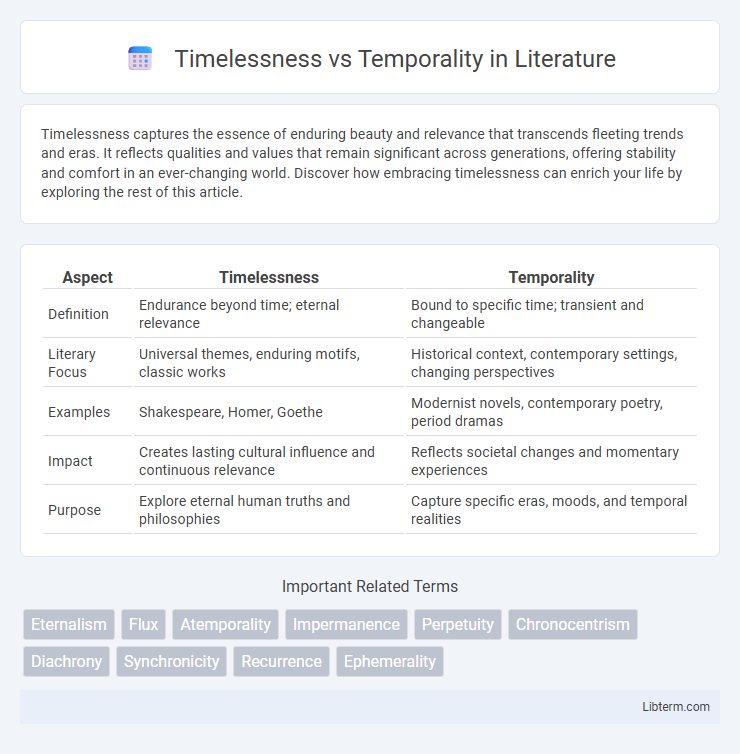Timelessness captures the essence of enduring beauty and relevance that transcends fleeting trends and eras. It reflects qualities and values that remain significant across generations, offering stability and comfort in an ever-changing world. Discover how embracing timelessness can enrich your life by exploring the rest of this article.
Table of Comparison
| Aspect | Timelessness | Temporality |
|---|---|---|
| Definition | Endurance beyond time; eternal relevance | Bound to specific time; transient and changeable |
| Literary Focus | Universal themes, enduring motifs, classic works | Historical context, contemporary settings, changing perspectives |
| Examples | Shakespeare, Homer, Goethe | Modernist novels, contemporary poetry, period dramas |
| Impact | Creates lasting cultural influence and continuous relevance | Reflects societal changes and momentary experiences |
| Purpose | Explore eternal human truths and philosophies | Capture specific eras, moods, and temporal realities |
Understanding Timelessness and Temporality
Timelessness represents an eternal, unchanging state beyond the constraints of time, often associated with universal truths and abstract concepts, whereas temporality emphasizes the finite, dynamic nature of existence marked by past, present, and future. Understanding timelessness involves grasping ideas that transcend time, such as mathematical truths or spiritual principles, while temporality requires recognizing the sequential flow and impermanence inherent in life experiences and events. Analyzing both concepts enriches perspectives on how reality and consciousness interact within and beyond the boundaries of time.
Historical Perspectives on Time Concepts
Historical perspectives on time concepts reveal a tension between timelessness and temporality, where ancient philosophies like Plato's idealism emphasize eternal, unchanging forms contrasting with Aristotle's focus on temporal change and process. Medieval thinkers integrated these views through theological frameworks, positioning divine timelessness alongside human temporal experience. Enlightenment and modern perspectives increasingly prioritized empirical, linear time, reflecting societal shifts toward progress and historical causality.
Philosophical Foundations of Timelessness
The philosophical foundations of timelessness explore concepts beyond temporal constraints, emphasizing existence in an eternal, unchanging state. Thinkers like Plato and Augustine posited that timelessness relates to the realm of forms or divine eternity, where past, present, and future converge into a single, indivisible reality. This contrasts sharply with temporality, which denotes sequential events and the flow of time experienced in human consciousness.
The Ephemeral Nature of Temporality
Temporality embodies the constant flux and transient nature of existence, where moments emerge and fade, emphasizing impermanence and change. The ephemeral nature of temporality highlights how time-bound experiences shape human perception and memory, underscoring a dynamic reality limited by duration. This contrasts sharply with timelessness, which suggests permanence, continuity, and an unchanging essence beyond temporal constraints.
Timelessness in Art and Literature
Timelessness in art and literature captures universal themes and emotions that resonate across cultures and historical periods, ensuring enduring relevance. Works embodying timeless qualities often explore fundamental human experiences such as love, mortality, and identity, transcending their original context. The concept of timelessness allows artistic expressions to maintain significance without being confined to a specific temporal moment or trend.
Temporality and Human Experience
Temporality shapes the human experience by grounding existence in the flow of past, present, and future, influencing memory, anticipation, and identity formation. Human consciousness is intrinsically linked to temporal awareness, as emotions and decisions are tied to the perception of time's passage and change. This dynamic interplay between time and experience drives the evolution of personal meaning and cultural narratives.
Cultural Interpretations of Time
Cultural interpretations of time vary significantly, influencing the perception of timelessness versus temporality across societies. Indigenous cultures often view time as cyclical and fluid, emphasizing continuity and interconnectedness, while Western cultures typically adopt a linear and progressive perspective, prioritizing punctuality and schedules. These divergent temporal frameworks shape social behaviors, rituals, and worldviews, highlighting the deep interrelation between cultural context and the human experience of time.
Timelessness vs Temporality in Science
Timelessness in science refers to universal laws and constants that remain unchanged across time, such as the speed of light or the laws of thermodynamics, providing a stable foundation for scientific inquiry. Temporality, by contrast, emphasizes the evolving nature of scientific knowledge and phenomena, where theories adapt based on new discoveries and empirical data, reflecting the dynamic progression of science. Understanding the balance between these concepts helps clarify how science seeks eternal truths while accommodating temporal changes in knowledge and context.
Impacts on Identity and Memory
Timelessness fosters a stable sense of identity by preserving core memories and experiences beyond temporal changes, enabling individuals to maintain continuity in self-perception. Temporality introduces flux and evolution in identity, as new experiences reshape memory and influence self-understanding over time. The interplay between timelessness and temporality critically shapes how memories anchor identity, balancing permanence with change in personal and collective narratives.
Bridging the Gap: Finding Balance Between Timelessness and Temporality
Bridging the gap between timelessness and temporality involves integrating enduring principles with adaptive change to create a balanced perspective. Emphasizing core values that withstand temporal shifts ensures relevance while acknowledging the necessity for evolution in response to contemporary contexts. This balance fosters resilience, allowing traditions to remain meaningful without stagnation amid constant societal transformations.
Timelessness Infographic

 libterm.com
libterm.com